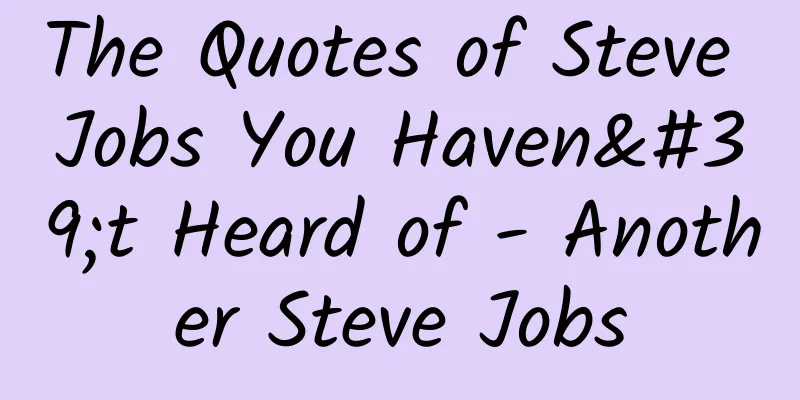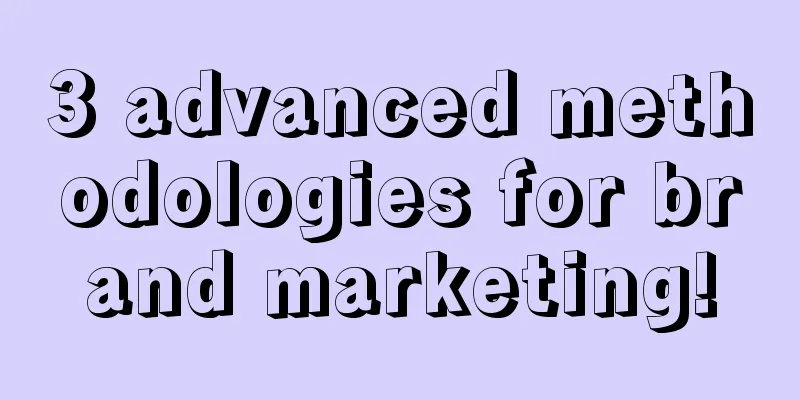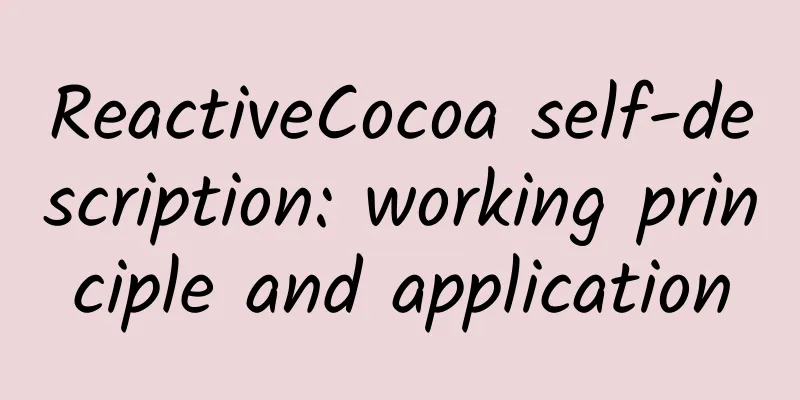The Quotes of Steve Jobs You Haven't Heard of - Another Steve Jobs

|
Deciding what not to do is just as important as deciding what to do. —Steve Jobs, 1997 Tren Griffin started his blog post with this quote from Jobs to tell readers that his discussion in this article will be limited to the inspiration Jobs brought him about business (not his personality, etc.). At the same time, the time when Jobs said these words is also important for understanding his words. 1. In computer hardware, if the boss is lucky, the difference between the best employees and the average employees may be 2 to 1. In the automotive industry, it may also be 2 to 1. But in the software field, the difference between a good programmer and an average programmer is at least 25 to 1. My secret to success is that we only hire the best employees in the world. Especially when you are in a field where the difference can reach 25 to 1, young people, it is definitely worth it. [1995] The problem is that in hardware, you can't make a computer that's twice as good as anyone else's. Too many people know how to do it. Maybe if you're lucky you can make hardware that's twice as good or half as good as anyone else's, but in six months everyone will catch up. But software is different. The fact is, I think the leap we've made in software is at least five years ahead of our peers. [1994] This phenomenon described by Jobs, especially when combined with supply-side economies of scale and demand-side economies of scale, creates a myth. This shows that the electronics industry is nonlinear in terms of output. Once the products provided by merchants are digital, even a small advantage tends to lead to a "winner takes all" result. Power law distributions in business are also related to this “winner takes all” phenomenon. The huge wealth of a small number of tech company founders is one result of this phenomenon. As another example, the power law distribution in venture capital company bonds and financial returns among venture investors are part of the black swan theory (unpredictable major rare events that are unexpected but change everything). The tendency of fiscal outcomes to produce unequal income distribution is not new, just as the rich get richer, which is similar to what has been recorded in history. What is new is that digital systems are accelerators of the Matthew effect (rich get richer) phenomenon. This is not an article about technology, but it is worth noting that the second paragraph about hardware was said by Jobs in 1994. NeXT (the computer company Jobs founded after being fired from Apple in 1985) had just withdrawn from the hardware industry in 1993, so at this time Jobs had already narrowed down his original large-scale business to a software company. The iPhone was released in 2007. Did Jobs contradict himself? Another smart friend pointed out: "The irony is that what makes the iPhone stand out is precisely its hardware. In particular, the screen is larger than any previous phone and the touch is more sensitive. Without innovative hardware, multi-touch and iOS would be meaningless." Jobs may mean that software is another factor that allows Apple's barrier to last longer. Hardware does provide some considerable advantages, but this advantage is not as huge as that of software, so hardware innovation must be long-lasting. In other words, Jobs may mean that the barrier created by hardware is more unstable, so continuous innovation is needed. "Twice or half as strong as the opponent" in hardware is still an advantage. How nice it would be if we could ask him in person? 2. If we don’t eat ourselves, someone else will eat us. [Excerpt from Isaacson’s Steve Jobs autobiography, 2013] In a Black Swan environment, powerful nonlinear phenomena can help you or destroy everything in an instant. A mistake made many years ago may eventually lead to serious financial losses. Bill Gates once said to me many years ago, "The things that make me work hard and worry about" are the things that may reduce the power of network effects. 3. Be hungry for knowledge and be humble as if you were ignorant. 【2005】 Nassim Taleb wrote in his book Antifragile: This quote from Steve Jobs' famous California speech may mean that when you see the upper limit of something, you should be crazy but still rational enough to make choices. Any trial and error can be seen as a manifestation of the results of a choice, and over time one can identify a best result and keep working towards it. I recently wrote that in the venture capital industry, financial returns can be created by harvesting optionality. "Being hungry" means being alert to opportunities, waiting patiently, but striking quickly when the time is right. "Being foolish" means challenging conventional wisdom when there is great potential for climbing and relatively small landslides. 4. I always want to own and control the underlying technology in everything we do. [2004] Because when Woz and I started the company, we were the only ones doing everything, and we weren't particularly good at working with others. I think Apple would do better if it had more of a collaborative component in its DNA. [2005] We had to give up the idea that for Apple to win, Microsoft had to lose. We needed the idea that for Apple to win, Apple had to do something really great. If other companies could help us, that would be great. [1997] People like Jobs, John Malone, and Elon Musk understand the business issues associated with wholesale transfer pricing as well as anyone in the tech world. In simple terms, wholesale transfer pricing is when Company A offers a unique product XYZ at a low price to Company B, so that Company A can profit from Company B by raising the wholesale price. Before the iPhone, the way Jobs denied wholesale transfer pricing rights to music owners in the iPod/iTunes business model was powerful. 5. The core of Apple is not cost cutting. The core of Apple is to innovate and break out of embarrassing difficulties. [2004] Many companies choose to downsize, and maybe that's the right thing for them. But we choose another path. [2010] In the technology industry, stopping investment in R&D means an inevitable, often nonlinear decline. Many companies have paid the price for their decision to buy back shares rather than invest in R&D, which is tantamount to eating the seeds they have been working on for a long time, a near-suicidal act with a wide range of negative effects. 6. Even a small thing can take years. Any major thing will take at least five years, and more likely seven or eight years. [1995] Too many founders don't know what they're promising when they start a business. It takes years to build something really good. Yes, a few people have tried SaaS (software as a service) in the past few years, but first, it's not common, and second, there are no Apple, Microsoft, or Google-level impact companies. The flip side of this is that not every company has to change the world. It's fine to have a small, profitable company. Not every company needs to get venture capital. 7. My management style is that of the Beatles. I say this because in their band, every member prevents others from going astray, and there is a mechanism similar to mutual inspection. When they disband, they can't produce good works at all. This is the chemical reaction of a small team, and its chemical reaction effect is much better than the simple addition effect. So Lennon prevents McCartney from being too trendy, and the latter prevents the former from floating into the sky. It's a dream combination. As for Harrison, I think he is the soul of the band to a great extent in the later period. I don't know what the drummer Starr did. [2003] This is a confusing statement, but it's worth thinking about because he did say it. A friend who knew Jobs well said that he was looking for the "control" that McCartney had, and that he idolized Lennon. The way Jobs interacted with others was not like the Beatles. It was more like he was saying that every person on the planet has strengths and weaknesses, and that different personalities can balance each other out to make a great team. By having a diverse team - including a full range of skills and talents, if they work together well, the team's output can be far greater than the sum of its parts. This magical effect can be positive or negative. Venture capitalist Bruce Dunlevie once said that every once in a while, a unique team comes along and then something magical happens. The chemistry is never exactly the same, but there are always some similar characteristics. 8. Creativity is about connecting things. When you ask creative people how they do things, they always feel a little guilty because they didn't really do anything, they just saw something. After a while, everything seems clear. [1996] Back to square one again... I am free to enter one of the most creative periods of my life. [2005] There are many things that inspire my creativity, but sometimes it’s hard to see what’s right in front of you. For example, Steve Jobs said: During my first few years at NeXT, I really understood two things I had seen at Xerox PARC in 1976: one, of course, was graphic interaction, and the other, as I have only recently realized, was sophisticated personal computer networking, what I now call "interpersonal computing." At PARC, they had 200 computers connected by email and file servers, forming an online collaborative community that they used every day. I didn't realize it at the time because I was so excited about graphic interaction alone. As I write, I’ve discovered that people love and are great at learning from metaphors. Connecting things in different ways is not only a great way to spark creativity, it’s also a great way to transfer knowledge. I have to quote Charlie Munger: “You can only improve if you learn how to learn. Nothing in my long life has served me better than continuous learning.” When Jobs said “back to square one again,” I strongly suspect he was elaborating on the Buddhist monk Shunryu Suzuki’s point: “In the mind of a beginner there are many possibilities, but in the mind of an expert there are few.” 9. I think one of the great things about Apple computers is that the people who work with them happen to become the best computer scientists in the world, even though they should have been musicians, poets, artists, zoologists or historians. [1996] This idea is consistent with Charlie Munger's "mental models" philosophy: "What is basic, worldly wisdom? The first rule is that you don't really know anything if you just remember a few individual facts and try to recall them. If the knowledge is not linked together into a theoretical grid, the format is not very useful. You have to know some big concepts in a theoretical framework and then be proficient in using all of them, not just a few of them. Many people are trained in one model - in economics, for example, they try to solve all problems in the same way." Many professors only think about their own theory and think it is the best. For example, a nutritionist may think he can cure everything, or a chiropractor may think he can cure depression. This is typical of those "people with hammers" who think "everything looks like a nail" even though it may not be a nail. In the words of Philip Tetlock, sometimes it is better to be a specialist than a generalist. 10. People think that focus means saying yes to something you're already focusing on. But it doesn't have to be. It can also mean saying no to a hundred good ideas. You have to choose carefully. [2004] The innovation approach is to say no to a hundred things. It can be both for the company and the product. We are always thinking about which new markets we can enter, but only by saying no can you focus on the things that are really important. [1998] Focus is very helpful. Focusing on a certain thing that can be done is not so much a task as it is creating industry barriers. Bill Gurley also pointed out this: "If everyone is right, pursuing only right does not guarantee outstanding performance." 11. I believe that about half of all the factors that separate successful entrepreneurs from unsuccessful ones are simply hard work. [1995] I have discussed missionary and money-hungry entrepreneurs in previous blogs. Missionaries are usually more diligent and more likely to create a company that has a profound impact or changes the world. Bill Gates once said, "We are naturally optimistic and are suited to creating big companies. Every myth we had about creating products and learning new things has come true. Of course, so have our opponents." If I could be a fly on the wall and fly back to a conversation that changed the technology world, I would choose the first meeting between Gates and Jobs. I can't help but add that when Silicon Valley marketing tycoon Regis McKenna introduced Jobs to chat with venture capitalist Don Valentine, the latter asked, why did you send me this traitor to mankind? Here, he used "traitor" to describe Jobs as someone who broke the rules and created new value for the world. |
<<: MBaaS in-depth review: Five clouds for building mobile apps
>>: Mobile games are now on the news broadcast, what are you waiting for?
Recommend
Tianshui Malatang has gained great popularity. It turns out that the soul condiment "Gan Gu Pepper" is the hidden king!
Gangu pepper is the soul of Tianshui Malatang. It...
App promotion: preparation before listing on app stores and other promotion channels!
After the App is developed, promoting the App nat...
Operational Leap: How to make a three-stage rocket land on a point, line, surface and solid?
When planning a strategy for a product, we cannot...
Shocked! Eating, drinking and having fun can actually cause this disease?
Recently, the Eyelid and Orbital Disease/Ocular P...
I made a pair of Metaverse gloves, costing 300 yuan
After being a VR game anchor for a month, in addi...
Why can't you "lie flat"? You will understand after looking at these data of Omicron
Since March, more than 270,000 cases of local inf...
Are you also dominated by "battery health phobia"? Please click on the "correct way" to charge
In today's information age, computers and mob...
Fight to the end "Fight" big screen TV version "Ximi Mahjong: Fight to the end"
Screen: Sound Effects: operate: Plot: Experience:...
Helicobacter pylori has these "effects"? Don't be complacent, you still have to treat it!
In 1982, Australian scientists Barry Marshall and...
Let’s talk about how to customize the appearance of symbol images in SwiftUI
Preface Symbol images are vector icons from Apple...
Woman’s cell phone number leaked: How much for one night?
Since November 27, Ms. Zhang, a resident of Jiyua...
Practical skills and methods for medical bidding promotion!
There are many ways to bid, and no single method ...
Humankind’s first collection of samples from the back of the moon was returned. The lunar soil obviously cannot be used to grow vegetables, so why did Chang’e go to the moon and dig soil?
On June 2, 2024, Chang'e-6 landed at the pre-...
Don’t be fooled again! Have you fallen into the trap of eyewash?
In recent years, with the exaggerated promotion o...









